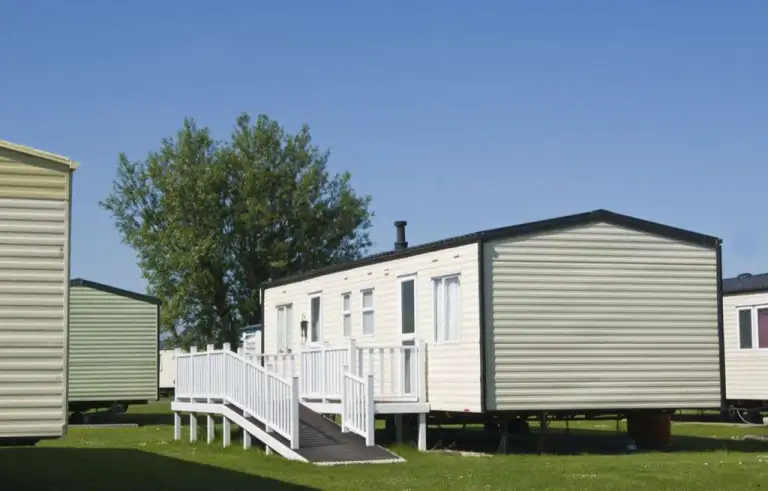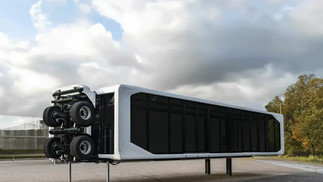Understanding California HCD State Approved Structures: What You Need to Know for Container Homes, Modular Homes, and Custom Business Trailers
- Gueston Smith
- Sep 19, 2024
- 5 min read
Updated: Feb 18, 2025

As innovative housing and business solutions gain popularity in California, it's crucial to understand the role of the California Department of Housing and Community Development (HCD) in regulating and approving various types of structures. Whether you're interested in a shipping container home, a modular house, or a custom luxury business trailer, HCD approval is often a key factor. Let's break down what you need to know about HCD-approved structures and how they apply to these unique building types.
What is HCD Approval?
The California HCD is responsible for ensuring the safety and quality of certain types of manufactured structures in the state. HCD approval means that a structure has been designed, constructed, and inspected according to state standards for health and safety.
Key points about HCD approval:
It only applies to Factory-built housing (FBH) and building components manufactured for sale in California.
Approved structures must bear an HCD Insignia of Approval before leaving the factory.
Local building departments handle installation inspections and permits.
Distinction Between Factory-Built Housing (FBH) and Manufactured Housing
It’s essential to distinguish between FBH and manufactured housing, as they follow entirely different sets of codes and approval processes:
Manufactured housing is federally regulated by the U.S. Department of Housing and Urban Development (HUD). These structures, often referred to as mobile homes, follow the HUD Code, which establishes construction and safety standards on a national level.
Factory-built housing (FBH), on the other hand, must comply with California building codes, including the International Building Code (IBC) and local building codes. FBH structures are built in a factory and then transported to the installation site, but they are inspected and regulated in the same way as traditional on-site construction.
Understanding this distinction helps ensure you’re navigating the appropriate approval process depending on the type of structure you are building.
Shipping Container Homes
For shipping container homes to be HCD-approved as factory-built housing:
The container conversion must be done in a factory setting, not on-site.
The manufacturing process must be approved and inspected by HCD or HCD-approved agencies.
The finished home must meet all applicable building codes and standards.
An HCD Insignia of Approval must be affixed before the unit leaves the factory.
If you're considering a shipping container home, work with a manufacturer experienced in obtaining HCD approval to ensure compliance.
Modular Homes
Modular homes often fall under HCD's factory-built housing regulations:
They are constructed in sections at a factory.
Each section must be inspected and approved during manufacturing.
HCD Insignias are required on each approved section.
Local building departments handle on-site assembly inspections.
Choosing an HCD-approved modular home manufacturer can streamline the permitting and approval process.
Custom Luxury Business Trailers
For business trailers used as mobile retail or vending units:
These may fall under HCD's commercial modular regulations rather than FBH.
Design and construction must still meet state standards for safety and quality.
HCD Insignias are required, but the specific requirements may differ from residential structures.
Local jurisdictions may have additional requirements for business use.
When designing a custom business trailer, consult with HCD early in the process to ensure compliance.
Zoning and Land Use Considerations
Even with HCD approval, local zoning laws still play a crucial role in determining where these structures can be placed. Zoning regulations can vary significantly depending on the city or county, affecting whether a container home, modular home, or business trailer is allowed in a particular area. You may need to obtain variances or comply with specific ordinances. Always check with local authorities before finalizing your project.
Energy Efficiency and Environmental Considerations
California’s Title 24 Energy Standards apply to many structures, including container homes and modular buildings. These regulations ensure that homes and commercial spaces are energy-efficient, and complying with them is necessary to pass local inspections. Consider integrating solar panels, energy-efficient appliances, and smart home technologies to meet these standards while reducing environmental impact.
The Role of Third-Party Inspection Agencies
HCD often delegates inspections to third-party agencies that are authorized by the state. These agencies ensure that both factory-built housing and commercial modular buildings meet state regulations. By working with an HCD-approved third-party inspector, you can ensure compliance throughout the construction process, helping to avoid delays and additional costs.
Innovative Technologies in Compliance
As technology advances, incorporating innovations like 3D printing, smart home systems, and sustainable materials into your design may seem appealing. However, it's important to verify that these innovations comply with HCD standards. Working with a design team experienced in integrating cutting-edge technologies while maintaining compliance with state regulations is crucial for approval.
Accessibility Requirements
With an increasing focus on inclusivity and accessibility, many new structures need to comply with the Americans with Disabilities Act (ADA). Whether you’re building a container home, modular home, or business trailer, integrating accessible features can make your structure more appealing while ensuring it meets both HCD and federal ADA requirements.
Insurance and Financing Considerations
HCD-approved structures often have better financing options because they adhere to standardized safety and quality measures. Banks and financial institutions are more likely to offer competitive loans for approved structures, and insurance companies may also provide lower rates due to the reduced risk. It's advisable to discuss your options with financial institutions early in the process.
Retrofit and Renovation Guidelines
For those interested in converting or renovating existing shipping containers or modular homes, it’s important to understand that major structural changes may require re-approval from HCD. This applies to both new additions and retrofitting older structures. Ensure your renovation plans comply with state standards to avoid costly penalties or delays.
Benefits of HCD Approval
Streamlined local permitting: HCD-approved structures often face fewer hurdles with local building departments.
Quality assurance: Rigorous inspections help ensure safety and durability.
Statewide acceptance: HCD approval is recognized throughout California, allowing for smoother interstate or county-wide installations.
Challenges to Consider
Cost: The approval process can add to the overall cost of the structure. This is particularly relevant for custom designs that need to meet unique regulatory requirements.
Time: Obtaining approvals can extend your project timeline, so be prepared for potential delays in the construction process.
Design limitations: Some innovative or unconventional designs might face challenges in meeting HCD requirements. Working with experienced designers and contractors can help mitigate these issues.
Conclusion
Whether you're dreaming of a shipping container tiny home, planning a modular housing development, or launching a mobile business in a custom trailer, understanding HCD approval is crucial in California. By working with experienced manufacturers and staying informed about regulations, you can navigate the approval process successfully and create innovative, compliant structures.
For more information, visit the California HCD website or consult with a licensed contractor familiar with HCD-approved structures.
















Comments